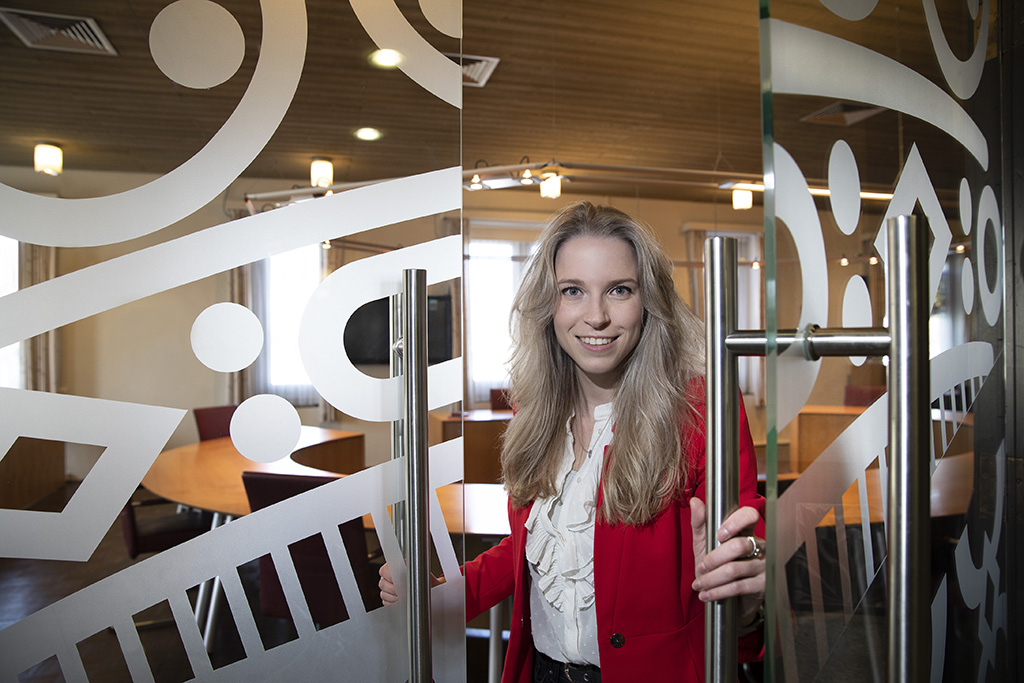Annelieke (25): ‘You represent the local interest, that’s all that matters’
The municipal elections are approaching. Because many young people are also competing for a seat on the city council, we would like to introduce four young candidates to you. Today we introduce Annelieke Huijerjans (25), a Tilburg University alumna and since recently a lecturer in labor law at this university. In these elections she is in third place on the Someren Gemeenschapslijst.

For more than half a year Annelieke was a civilian representative of the Provincial Council in her hometown Someren. In this position she not only supported the party members in their council work, but she was also allowed to have a say regarding the content. To her great surprise, whilst having a coffee, she was even asked if she would like to take the third place on the list for the next elections. Well, she wanted to. Her campaign plan: just go into the pub and talk to young people.
Hi Annelieke, why do you want to enter the Someren City Council?
“I’m just excited to be working with a group of young people to make a difference in the place I feel so at home. Besides the opportunity to make an impact within our community, it’s also a great opportunity to do things differently, and take away the stuffy image of local politics.
“Because of my background as a jurist, I have always had an interest in politics and enjoy reading difficult texts. It seems extra cool to translate that difficult and complex theoretical material to citizens and explain to them why the municipality does what it does. It’s also great that people start recognizing me and approaching me for issues. That’s typical of a smaller municipality: everything is about recognition and involvement.”
A recent study (Dutch only) from research firm Overheid in Nederland found that barely seven percent of the approximately 8,500 council members are under the age of 30. That is remarkably low. Why are young people important in local politics?
“This is important because decisions are made in the City Council that also affect young people. And I would say: young people in particular because they are the future. However, there is a tendency to talk about them instead of with them. They are underestimated. Young people can have a great say in municipal affairs. Not only can they do it, but they deserve it. After all, the youth are the future residents of the municipality.
“Although I will never underestimate the life experience and knowledge of older people, they simply have a different perception of life compared to young people. The view of young people is more open, more global, and perhaps less inhibited. In short, young people see fewer barriers. Today, there are many issues that require such a fresh perspective: climate issues, the digital age, the housing crisis. It would be a shame if that new perspective of young people was left out of decision-making on these issues.
“That the proportion of young people in the City Council is so small is the parties own doing. In our party, young people are given trust: of our first six candidates, four are in their twenties. This does not happen in all parties. Often young people are used to make sleek videos on social media, only to be denied a seat in the elections. That kind of bragging frustrates me; give them the confidence or do nothing.”
What themes are particularly close to your heart?
“The beauty of a local party like Gemeenschapslijst Someren is that people with different political orientations come together to talk about what is best for the municipality. That’s what the decision is based on. So, you represent the local interest, that’s all that matters.
“Specifically, this means—however cliché—that more houses need to be built in Someren. It is mission impossible here: there is not a single house available and everything that becomes available is outbid by tons of euros. Building is therefore the most important thing. To safeguard the quality of life in Someren and to keep the clubs and associations going, people must not only be able to live there, but also want to. You do that by creating a village where people like to be and feel at home.”
How do you combine politics with your current work?
“That’s perfectly fine. Like me, everyone in our party has a full-time job in addition to politics. The Council and party meetings are always in the evening and often only about once or twice a week. On my day off or at the weekend I read through the documents in preparation for these meetings. I do this reasonably well because I already have some experience with it. I’m not afraid that the workload will increase when I’m actually on the Council.”
What personal challenges do you see ahead you?
“Content debating is totally my thing; I can really get into that. And because I love doing it, I would like to become even better at it. In particular, I want to learn how to ask certain questions as tactically as possible. I’m also curious about political strategy and I’m looking forward to making all those tricky texts and topics my own.”
Translated by Language Center, Riet Bettonviel






